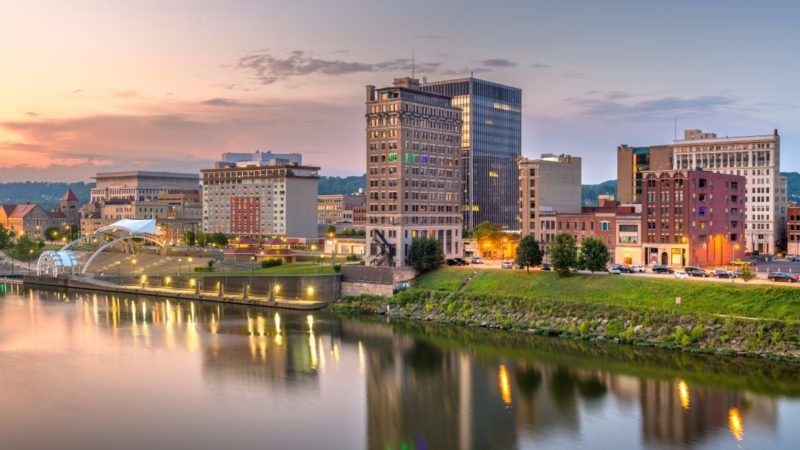It's Time To Leave Your City. Come to West Virginia With Me.
It’s not another Free State Project, just a way to live a better life during the coronavirus era.

I am leaving the District of Columbia to work remotely in free, beautiful, inexpensive, friendly, practical West Virginia. I invite you to join me.
You can live an urban life in Charleston or, just minutes away, you can surround yourself in natural beauty. You can work in policy or construction or whatever else a city offers. The cost of living in Charleston is just 80 percent of the national average. Real estate is especially cheap. For a $25,000 mortgage, your family can start over; for a $65,000 mortgage, you can do well in a great neighborhood. Have kids? The state will soon allow its first charter schools.
School choice isn't the only way West Virginians might enjoy more freedom than you do. With COVID-19 cases among the lowest in the nation, staying at home is now voluntary, not mandatory.
To assess West Virginia's relative freedom based on your own values, you can use the personalization function at Freedom in the 50 States, a website run by the Cato Institute. For me, individual rights matter a lot. So do taxes. A city or state that lets people keep more of their own money has greater trust in them and can make less trouble shifting money around.
The income tax in my bracket in D.C. reaches 8.5 percent; in West Virginia, it's a less disappointing 6.5 percent. Philadelphians at my income level will see a nearly identical 6.5 percent. If I lived in Virginia or Michigan, I'd land somewhere from 5.75 to 6.75 percent, depending on the city I lived in.
Property taxes are harder to compare because of local variation and disagreement among online sources, not to mention the wide variation in median home values. In Charleston's Kanawha County, the property tax is 0.67 percent, which is slightly above most counties—yet this is more than offset by a median home value of scarcely $100,000. This means paying less than $700 in annual property tax at the median. In D.C., the median homeowner might have a better house (median $640,000) but will pay $2,900 in property tax, about four times as much. The median mortgage is presumably hundreds of thousands of dollars higher in D.C., where mortgage rates add 4 percent to annual housing costs.
The sales tax in D.C., Maryland, and nearby Arlington, Virginia, is 6 percent, the same as Michigan and West Virginia, though Charleston adds 1 percent. New Jersey's is 6.25 percent. New York City's is nearly 9 percent. If you're escaping broke and broken Chicago, say goodbye to a 10.25 percent sales tax and one of the highest property tax rates in the country.
D.C. also charges a 10 percent tax on restaurant and takeout food, while West Virginia keeps it at 6 percent. I already shop in Virginia to avoid the District's sin tax on plastic bags, but this is not an issue in West Virginia, where bag banners and taxers have failed in the state legislature since at least 2011.
Meanwhile, the Tax Foundation's business tax climate index puts West Virginia slightly above the median with a ranking of 23. The worst three are, to no surprise, New York, New Jersey, and California. (The Tax Foundation also provides income, property, and sales tax rates.)
A negative: Charleston is one of several cities that charge workers a tax for the "privilege" of doing business. That's backwards. Businesses and workers are bringing economic fruits to the city and should be rewarded, not punished.
I'm not proposing a second Free State Project here. I expect no particular ideological commitment. If the benefits of moving outweigh the costs of staying put—if you are a happiness seeker who is ready to move—that's enough. Vote or don't; I won't mind. Mere voting does not exhaust our civic engagement with our neighbors. Enriching our communities through voluntary action will make the difference.
When the young Benjamin Franklin saw a need in Philadelphia nearly 300 years ago, he didn't form a citizen action committee to lobby the city government. He just networked with engaged friends around town. That's how Philadelphia got a library company and a fire company. Franklin launched the library with 50 subscribers. His fire company launched with 30, and the idea caught on quickly. In his autobiography, he remembered watching "one new company being formed after another, till they became so numerous as to include most of the inhabitants…in fact, since these institutions, the city has never lost by fire more than one or two houses at a time."
Neighbors helping neighbors in need can overcome many challenges. Sometimes, though, it is better to emigrate for the sake of life and liberty, to take our mutual efforts toward happiness somewhere else. Remember, you can work remotely, too! When you're ready, I will welcome you to West Virginia.


Show Comments (115)